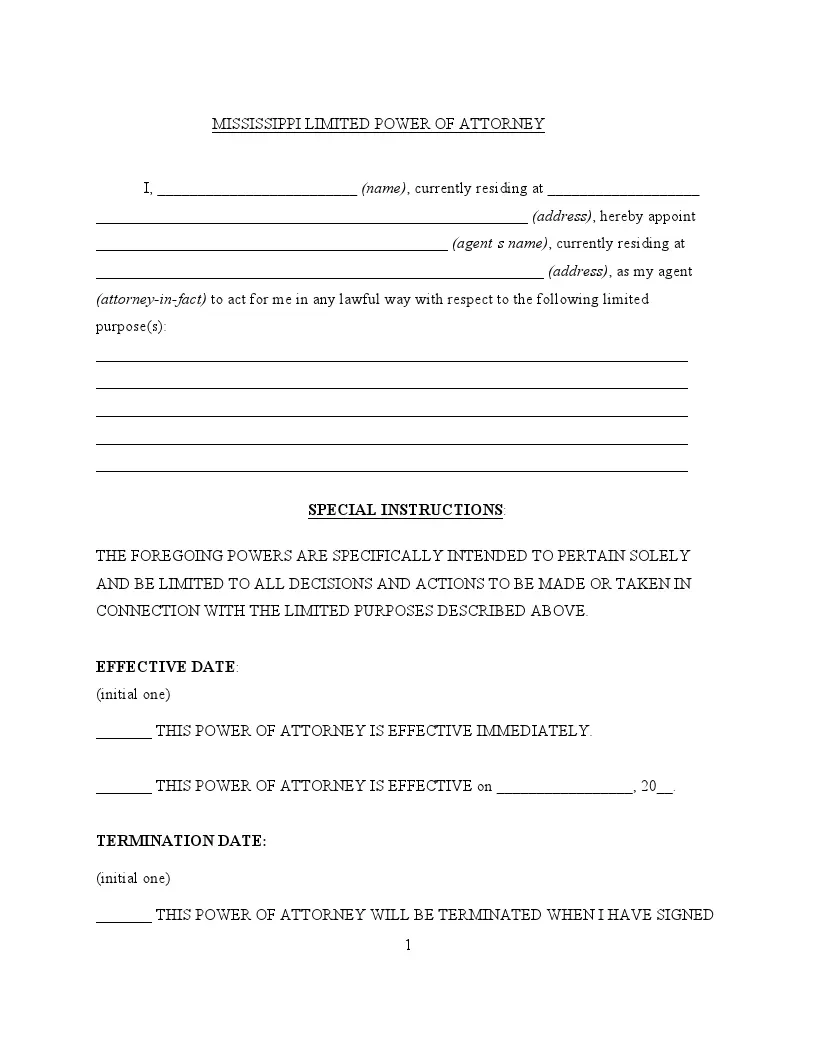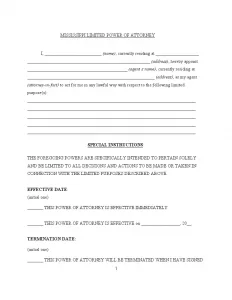Mississippi Limited Power of Attorney Form
The Mississippi limited power of attorney is a legal instrument that assigns a certain individual, referred to as the agent or attorney-in-fact, the capability to undertake specific duties on the principal’s behalf. The principal is the person who grants authority in a power of attorney, while the agent, also known as the attorney-in-fact, is the one who is authorized to act on the principal’s behalf. The limited power of attorney differs from a general POA as it confines the agent’s authority solely to specific activities or circumstances that must be specified within the document.
Common uses for a limited power of attorney in Mississippi include handling financial transactions or managing real estate affairs, but only under the circumstances detailed by the principal. For example, a principal might grant an agent a limited power of attorney to sell a property while they are out of the country.
Draft this document clearly to avoid any ambiguity. To save time, use our Mississippi power of attorney forms.

Build Your Document
Answer a few simple questions to make your document in minutes
Save and Print
Save progress and finish on any device, download and print anytime
Sign and Use
Your valid, lawyer-approved document is ready
The Mississippi Code Annotated outlines the regulations for creating a limited power of attorney under Sections 87-3-1 through 87-3-113 (Uniform Durable Power of Attorney Act). Although the law doesn’t specify specific signing requirements, it is strongly recommended that the principal and the agent sign the document with a notary public present. This step strengthens the legal validity of the document and reduces the likelihood of disagreements or objections.
Important factors to keep in mind when signing a limited power of attorney in Mississippi are:
- Ensuring that the principal is of sound mind and acting without coercion.
- The document must be notarized to confirm the parties’ identities and their understanding of the powers being granted.
- The POA should be recorded in the relevant county if real estate transactions are involved.
Following these practices strengthens the POA’s enforceability and guarantees that the agent can execute assigned tasks in a way that reflects the principal’s intentions.
Mississippi Limited Power of Attorney Form Details
| Document Name | Mississippi Limited Power of Attorney Form |
| Other Name | Mississippi Special Power of Attorney |
| Relevant Laws | Mississippi Code, Sections 87-3-101 to 87-3-113 |
| Avg. Time to Fill Out | 8 minutes |
| # of Fillable Fields | 32 |
| Available Formats | Adobe PDF |
Filling Out Mississippi Limited POA
Completing the Mississippi limited power of attorney allows you to appoint an agent to handle specific legal, financial, or medical tasks on your behalf. The form must be filled out correctly to meet all legal requirements.
1. Fill in Principal and Agent Details
Start by entering your full name and residential address in the designated areas at the top of the form where it states, “I, (name), currently residing at (address).” Then, please give the name and contact information of the individual you select to act as your representative. This individual will represent you for the specific reasons outlined in the document.
2. Specify the Powers Granted
The section labeled “SPECIAL INSTRUCTIONS” clearly outlines the specific powers you are granting to your agent. Be as detailed as possible to avoid ambiguity about the agent’s authority. These powers should relate directly to the tasks you want the agent to handle, such as managing certain financial accounts, selling property, or making medical decisions on your behalf.
3. Choose Effective and Termination Dates
You will need to initial next to the option that specifies when the document will become effective:
- Immediate effectiveness upon signing.
- Effective from a specific future date.
Similarly, decide when the limited power of attorney will terminate:
- Upon a written revocation by you.
- On a specified date.
- If you are determined to be incapacitated.
Ensure that these dates are filled out accurately, as they dictate the duration of authority granted to your agent.
4. Appoint a Successor Agent
If you believe it’s necessary, appoint a successor agent who will take over if the primary agent cannot perform their duties. Provide the name and address of the successor agent in the relevant section.
5. Sign and Notarize the Document
You must sign and date the form in the presence of a notary public. This step is crucial to verifying your identity and validating that you willingly sign the document and are under no duress.
6. Obtain Notary Acknowledgment
The notary will fill out the acknowledgment section, confirming they have verified your identity and witnessed your signature. This section includes the notary’s official seal, which is necessary for the document to be recognized legally.
7. Distribute Copies
Once notarized, distribute copies of the LPOA to relevant parties, such as financial institutions or medical facilities, where your agent must act on your behalf. Keep the original safe, and provide your agent with a copy.
